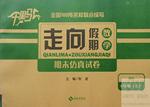题目内容
11.A ___ person is likely to make and keep more friends.( )| A. | considerate | B. | violent | C. | sensitive | D. | curious |
分析 一个体贴的人很可能会交到和保持更多好朋友.
解答 答案是A.考查形容词的辨析.A 体贴的,考虑周到的;B 暴力的;C 敏感的;D 好奇的.句意是"一个体贴的人很可能会交到和保持更多好朋友."故选A.
点评 解答此类问题首先需要理解每个单词的基本含义,并注意交叉含义间的区别,了解其特殊用法及习惯搭配等特点,然后结合语境选择正确答案.

练习册系列答案
 千里马走向假期期末仿真试卷寒假系列答案
千里马走向假期期末仿真试卷寒假系列答案
相关题目
2.If you ______ the above suggestions,you will look much better in no time at all.( )
| A. | follow | B. | will follow | C. | are following | D. | have followed |
19.His report was so exciting that it was ________interrupted by applause.( )
| A. | constantly | B. | instantly | C. | seldom | D. | never |
6.With the word"PM 2.5"____ appearing in media reports,people pay greater attention to it and seek health tips for smoggy days.( )
| A. | constantly | B. | instantly | C. | roughly | D. | firmly |